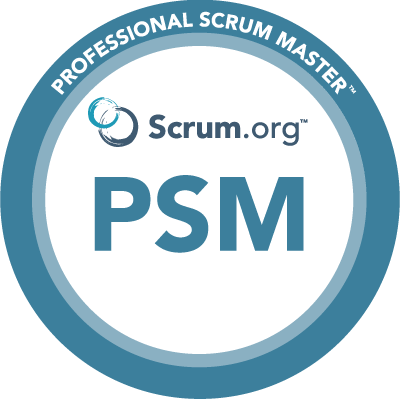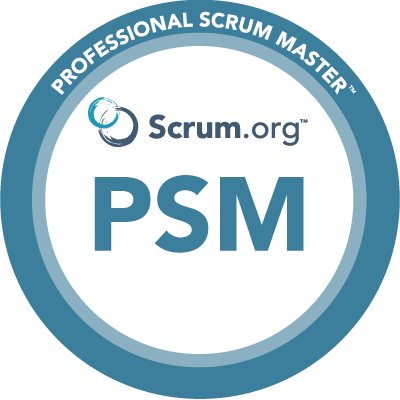TAUGHT BY: JOHN COLEMAN
Professional Scrum Master (PSM)- GUARANTEED TO RUN
Professional Scrum Master (PSM)- GUARANTEED TO RUN
Couldn't load pickup availability
Learn Professional Scrum and How to be a Better Scrum Master
Professional Scrum Master™ (PSM) is an interactive, activity-based course where students gain a strong understanding of Professional Scrum and the role of the Scrum Master. Through a combination of discussion and exercises, students develop a deep understanding of the underlying principles of Scrum and the Agile mindset while learning the practices applied by successful Scrum Teams.
The course also includes a free attempt at the globally recognised Professional Scrum Master I(PSM I) certification exam.
Course Overview
In this class, students are challenged to explore the Agile and Scrum principles so they can better understand what to do when applying Scrum to support their teams and organisations.
The course, developed by Scrum.org, uses a combination of instructor-led and activity-based learning where students work together in teams. Professional Scrum Trainers (PSTs) bring their own Scrum Master experiences and stories to the class and use their skills as professional trainers to deliver the material using their own unique delivery style. The result is an engaging, enjoyable learning experience where students gain a deep understanding of Scrum theory and principles, the Scrum Master accountabilities, and why each element of the Scrum framework is important.
Students leave this course with an appreciation for Professional Scrum, the agile mindset, and how to deal with common myths and impediments to agility. They gain knowledge and understanding about how to choose and apply the appropriate practices and techniques that will be most beneficial for their Scrum Teams.
View the different Focus Areas covered within this class and others.
Course Learning Objectives
- Help Scrum Teams deliver value to their organisation
- Understand the theory and principles behind Scrum and empiricism
- Understand how each part of the Scrum framework ties back to the principles and theory
- Understand uncertainty and complexity in product delivery
- Understand the meaning and importance of the Scrum values
- Learn what Done means and why it is crucial to transparency
- Know how to use the Product Backlog to plan with agility
- Understand the importance of self-managing teams, interpersonal skills needed, and the Scrum Master role
- Clarify the leadership role a Scrum Master play on the team
- Learn the skills and traits, and behaviour shifts required to be a Scrum Master
Professional Scrum Certification
All participants completing the Professional Scrum Master course will receive a password to attempt the Professional Scrum Master I (PSM I) assessment. The industry-recognised PSM I certification requires a minimum passing score of 85%. PSM class participants who attempt the PSM I assessment within 14 days of receiving their free password and do not score at least 85% will be granted a 2nd attempt at no additional cost.
Students explore common real-life challenges that Scrum teams and organisations face when it comes to organising Scrum Teams. This is followed by a deep dive into the Scrum Master's services as a true leader to the Scrum Team and the wider organisation.
WORKSHOP ENVIRONMENT
PLEASE NOTE:
Apart from accessibility reasons of pre-arrangements with the trainer, a condition of ordering live virtual training is it’s mandatory to have a camera on and mic on and be clear in the camera view. People can just be themselves; loved ones and pets are welcome. This condition is there to optimise the experience for all attendees and for the trainer. The trainer reserves the right to dismiss, without refund, attendees who refuse to turn on the camera and mic without good reason in the view of the trainer. Traveling during training is not permitted. Attendance at live virtual training on a phone screen only is not permitted, as desktop-size screens are needed.
Live Virtual
Each segment is 60-75 mins long with 15-30 min breaks. Attendees have the choice of spreading the workshop over several days if advertised or if other attendees are ok with that —no recording of the workshop to improve openness. The workshop size is limited to 20 attendees.
Workshop attendees will use Zoom/Teams, Mural, Slack, StoriesOnBoard, Strategyzer, Kanbanize/SwiftKanban, and John's physical flipcharts.
Learning online is almost as effective as face-to-face. The critical difference is working together online; it takes longer to do things. A "funnel" gets added to the Kanban Board for optional best efforts and additions to the official curriculum. Most questions will get answered to the satisfaction of the attendees, one way or the other.
Course delivery is heavily dependent on group activities with a combination of slides, flip charts, and exercises.
The approach is a combination of experiential training and Training From The Back of The Room, regardless of the training course, while sticking to the Scrum.org learning objectives. Many practical problems get discussed. and more often than not, options to solve problems are presented. But some problems need sessions in themselves, and it would be unfair to distract the class if the entire class doesn't want to take that path and/or the trainer is getting concerned that the learning objectives might not be attained within the training course time box. In addition, some topics could be completely outside the scope of the training class. To that end, some topics may need to be "parked." Some topics could be completely outside the scope of the training class. Best efforts are made to address "parked" topics during the workshop and/or subsequent video conference calls.
Rules to follow:
- cameras on
- mics on - let's avoid delayed interventions
- be on time for every segment
- no meetings/phone calls/emails during the active segments
- be self-aware and conscious of the needs of others to have their say
- no hijacking of the agenda; a free coach session is on offer per attendee; use that instead.
A SCRUM RESET IS OFTEN NEEDED IN THE WORKSHOP
If the class attendees demonstrate additional ability, bonus content may get covered. However, the class pace can get set to a slower pace by even one attendee who has not prepared for class, as per pre-class communications. While John Coleman's style is to assume zero knowledge, some attendees may have negative knowledge, and preconceived ideas that are incorrect, according to Scrum.org.
Negative knowledge creates drag for a training class. Hence John Coleman sometimes performs pre-training-screening-calls. While there are no formal pre-requisites for Scrum.org classes, the trainer may request in pre-training phone calls that some attendees go to Professional Scrum Foundations/Scrum Master (by any Scrum.org trainer) to ensure a smooth learning experience, even if the booked class ticket needs to be postponed to another date, refunding if necessary less banking fees. Either way, at the beginning of each workshop, some kind of Scrum reset takes place to align attendees and reduce the potential for learning drag later.
PAYMENT, FEES & CANCELLATION
To ensure a full refund, cancellation must be made up to 30 days prior to the class.
To start a return, you can contact us at john@orderlydisruption.com.
Payment in advance is required, with no exceptions. VAT plus online ticketing charges, if applicable, are additional. All documentation requirements for invoice payment by the training date must be declared at the outset. VAT is treated automatically by the online ticket provider, if applicable.
VAT additional. VAT is treated automatically. No responsibility is taken for costs resulting from cancellation/postponement. WhatsApp John Coleman at +447908539437 or email john@orderlydisruption.com for more details. A minimum quorum is needed for this class to proceed.
You may cancel up to the specified online ticketing deadline, and if so, depending on the payment engine/approach, the refund could have deductions for bank transfer fees.
You may postpone your ticket with a minimum of three business days' notice; thereafter, your lack of attendance at the booked date will be treated as a cancellation with zero refund (due to planning & venue costs for class numbers). Best efforts would be made to fit you into a later workshop.
Electronic manuals and Scrum.org assessment fees are included. Physical manuals are usually not provided.
Share

